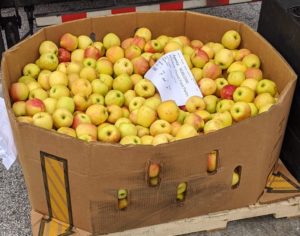Editor’s note: We are very grateful for food donations. At the moment, we ask that new groups or individuals consider donations of in-kind goods beyond food.
Each day, it takes countless donations to help Catholic Charities carry out its mission to improve the lives of Marylanders in need. Often, we might think of those donations as financial. Yet many are gifts of materials, goods, services, and items that make life easier for those we serve.
During the COVID-19 pandemic in particular, a number of organizations have stepped up to provide large quantities of these kinds of gifts – especially food.

Apples donated for neighbors in Brooklyn-Curtis Bay
“We are so grateful that so many organizations have stepped forward to offer what they could to help,” said Director of Community Engagement Rex Foster. “The outpouring has been a bright light.”
Generous area restaurants include Hellas Restaurant and Lounge in Millersville, The Hideaway in Odenton, Annapolis Smokehouse and Tavern, Sam’s on the Waterfront in Annapolis, Rinconcito Mexicano in Odenton, Mamma Roma in Odenton, Bayside Bull in Edgewater, Hip Hop Fish and Chicken in Glen Burnie, Severna Park Taphouse, and Spizzico Italian Kitchen in Arnold. Wing Stop has also contributed.
Catholic Charities USA has even connected farmers in Pennsylvania, who have given the residents at our senior communities and Caritas House 1,000 pounds of cheese and 400 single serving containers of yogurt.
Our partner at First Fruits Farm, Inc. donated 20,000 pounds of potatoes to our residents at Holden Hall, Hosanna House, and our Senior Communities; the ladies we serve at My Sister’s Place Women’s Center; our Baltimore City Head Start families; and our community partners in Cherry Hill and elsewhere in the city.
The Giant Foods distribution center in Jessup donated milk to our Baltimore City and Carroll County Head Start Families; our families at Anna’s House, and adults with developmental disabilities who receive support from Gallagher Services.
“This kind of giving is special in that we couldn’t ask individual donors to provide all this food at once,” Foster said. “A lot of it came to us without having to ask for it, and that means people have faith in the way we accompany neighbors in need. That’s meaningful for us. But it means more for those who receive the food.”
